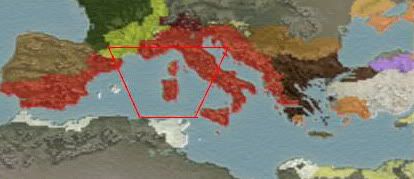Transcript of the college presentation during the lecture „The Roman Republic“ in 2003, University of Minnesota, USA
[Anna Chow speaking]:
Dear colleges, dear professor, last week we heard about the end of the second Punic war and the first Macedonian war. What was following these wars was a rather calm period without many foreign conflicts for Rome. I will give a short summary for this period that lasted until 166 BC, when the infamous Metellus became consul.
The war hero Spurius Cornelius Sulla became consul in 184 BC. In the first half of the second century BC the Senate was ruled by rich and prestigious families like the Scipions and the Cornelii. Even though the rich families often fought each other for power in the Senate, disputes were – yet - bloodless and civilized. One problem was that young people, like for example Tiberius Cornelius Scipio, were already popular, yet they were to young to have real power in the Senate, despite their influence. Scipio was a good example for this. He led armies to victory at the age of 25 in Spain, when he returned to Rome he was nothing but a young Senator in Rome. Bitter he turned to the military again, going to Greece where tensions were still high after the first war with Saneus. The other problem was that these prestigious families had become quite rich through the second Punic war, corruption and miss governance in the provinces was an untreated issue.
Rome in 180 BC.
Although a rather peaceful period, two smaller armed conflicts happened. At 179 BC the Taurisci, also called the Norici, invaded the northern border of Italy coming from the Alps. Although the numbers of people invading didn’t exceed some 8000 people it was the first barbarian invasion for over 100 years. In the same year consul Publius Denatus defeated the Norici at Ceneta and enslaved the saviours.
The following year the Macedonian king Leocharis Eurypontidos, who restored diplomatic relations with Rome, was murdered by Alexander IV a follower of Saneus, who declared himself king. Tiberius Scipio, always ready to go to war attacked Alexander IV in 178 BC after being provoked by the new king. In 176 BC he defeated the new king in the battle of Berora. Alexander IV had to agree to accept Roman governance in Epirus and disclaim hegemony over Greece. The Second Macedonian war only lasted for two years, but by now the Macedonian-Roman relationship was terribly hostile.
Scipio returned to Rome in 174 BC to finally become Consul, using this position to accumulate his fame and especially his wealth. His former friend and mentor Sulla, who also became consul in 172 and 170 BC, refrained from Scipio due to personal reasons.
The political situation in the Senate changed when the rather unknown former Praetor Caius Caecilius Metellus came to Rome in 167 BC.







 Reply With Quote
Reply With Quote
Bookmarks